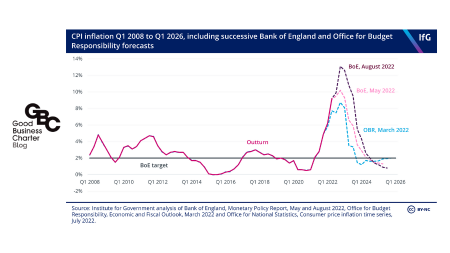Turbulent Times
26th September, 2022
I feel compelled to write a blog entry as we walk through all that is going on around us – a plummeting pound, high inflation, interest rates on the rise and the general cost-of-living crisis. What does this all mean for businesses upholding our commitments to responsible business behaviour?
Last week the Living Wage Foundation announced the new rates for the real living wage as £10.90 (up from £9.90) and hour and £11.95 for workers in London. This represents an increase of 10% which is certainly not unreasonable and most would agree that those on less than that would really struggle with the current cost of living, especially as it is those on the lower incomes that spend more of their income on food and bills. However, we are acutely aware that the reality for businesses of finding the budget to increase salaries to this – especially given expectations other salaries will require a similar if not identical uplift – will be out of reach for some. Thankfully they have until May of next year to implement it.
Yesterday on ‘Sunday with Laura Kuenssberg’ the managing director of Iceland commented that they do not use zero hours and would not want to have to resort to that in order to make the books balance. This is still a perfectly legal option that businesses can use, but the impact for those workers on such contracts is high especially given the lack of any certainty as to their take-home pay each month.
Huge advances have been made, accelerated by the pandemic, around employee wellbeing and in many ways, better attempts to hear from employees and value diversity, equality and inclusion. This enables businesses to better understand the challenges faced by different groups of people on the shop floor, and hopefully keep this present in the difficult business decisions they need to make at this time.
As we move to our non-employee components the focus seems to have shifted, somewhat alarmingly, away from urgent action on climate change and the steps required to get to net zero. The suspension of the green levy as part of the energy bills cap, which was being used to fund renewable development, was part of that. Now we would be the first to say there needed to be more focus on people as planet had dominated – but we also cannot afford to take our foot off the pedal in our response to the climate crisis. Extreme weather events this year are a continual reminder that we all need to ensure we are being responsible towards the environment.
The mini budget was all about supercharging growth and making the UK a more attractive place to invest in, and set up your business from. There was reference to lowering taxes to stop people seeking to avoid them. Forgive me, but I’m not sure a 1% cut is going to make much difference to that. I suspect that companies with tax havens and bizarre structures to avoid paying UK tax will continue to operate in that way until HMRC is better resourced to clamp down on these practices.
Successful businesses continue to put their customers first and will likely be in even greater competition with one another to convince them to spend their limited disposable income with them. Thank goodness there has been a cap for businesses on energy bills to help them balance their books.
Yet they do this amidst a background of huge supply chain challenges, and the weak £ is going to heighten these considerably for those importing from abroad. Prompt payment to suppliers is crucial as businesses seek to manage their cashflow, and is why we include this component, such a lifeline for small businesses in particular.
I was reflecting on the challenge our nation faces on productivity. It is our belief that responsible businesses will be more productive than the average business because of their motivated, better paid employees who feel they are in an inclusive place to work and where they are valued. This of course produces a better work ethic and a better service to customers. I think it’s fair to say though that I would imagine right now that productivity has sunk to an all time low as we find ourselves preoccupied with concerns over where the economy is going, and for many, how they are going to afford to still put food on the table this winter.
I salute every business leader who is walking through this challenging time, under immense stress of how to properly care for their workforce, ensure they continue to pay their suppliers on time and keep on the right track to net zero. It is possible, and we love hearing from our accredited organisations on what they are doing, but we acknowledge just how difficult this is to do well. The GBC provides a straightforward framework to guide decisions. The community of accredited organisations provides a safe place to bounce off ideas and highlight best practice as we all seek to improve.

